Understanding the Emotional Nexus of Grief and Addiction
Grief, a profound emotional response to loss, intersects intricately with substance use behaviors, impacting mental health, recovery, and societal perceptions. This article explores the multifaceted relationship between grief and substance use, emphasizing clinical insights, risk factors, emotional mechanisms, and comprehensive treatment strategies.
Defining Grief and Its Psychological Impact
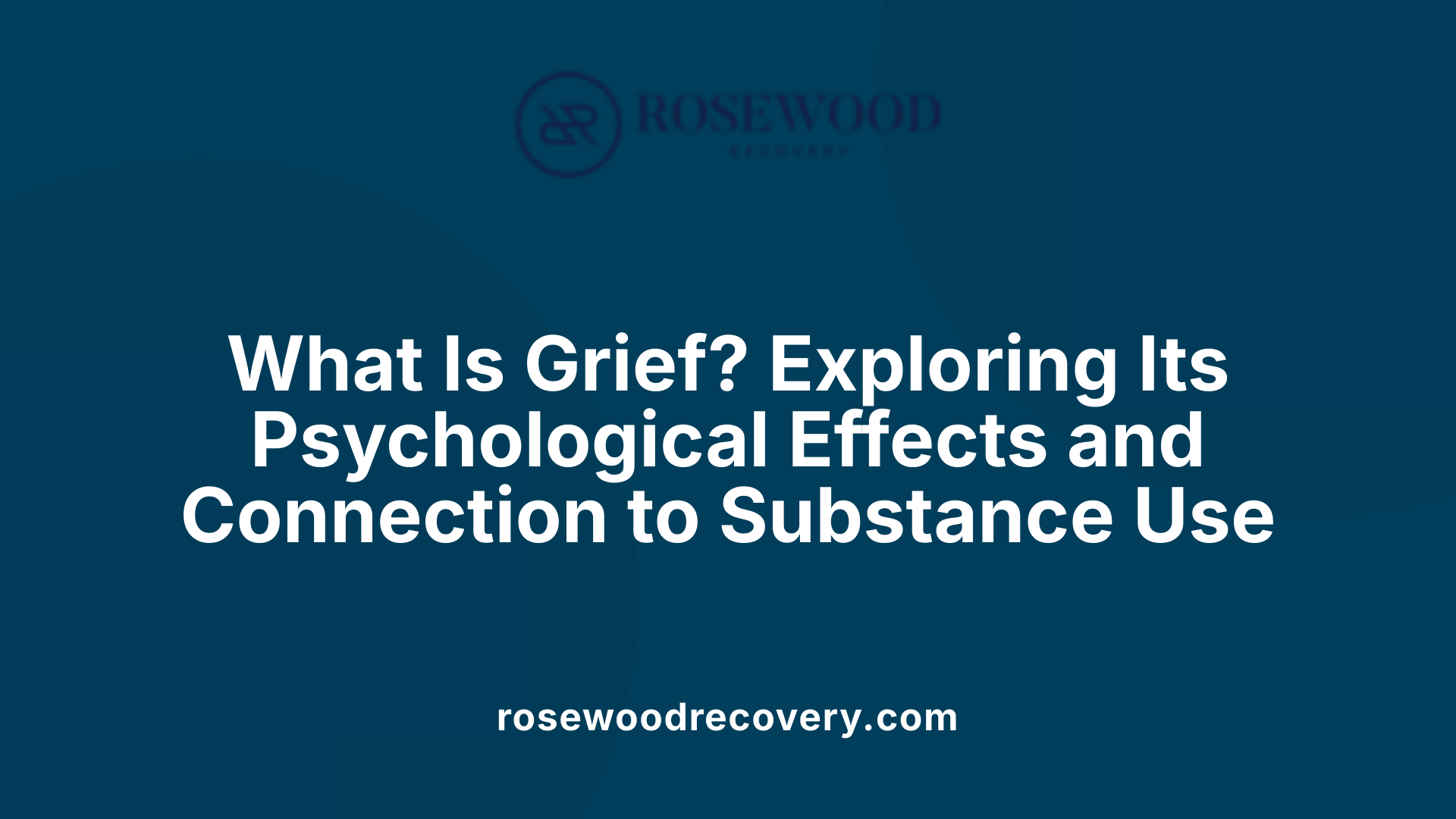
What is the connection between grief and substance use?
Grief and substance use are intricately linked because many individuals turn to drugs and alcohol as a way to temporarily escape or suppress the intense emotions caused by loss. During grief, especially if unresolved, emotional pain can become overwhelming, leading some to seek relief through substances. This behavior, however, often develops into unhealthy habits or addiction if not addressed properly.
Societal influences and cultural messages play a role by promoting alcohol as a social lubricant or stress reliever, which can inadvertently encourage misuse during vulnerable times. People with pre-existing substance use issues are more prone to relapse or worsening of their condition when faced with grief. Without healthy coping mechanisms, the cycle of grief and substance abuse can intensify.
Addressing grief with proper emotional support, therapy, and community resources is vital. Developing resilience and healthy ways to process loss reduces the risk of turning grief into substance dependency. Recognizing the danger signs early helps prevent the development of addiction and promotes long-term recovery.
Clinical Insights into the Grief-Substance Use Connection
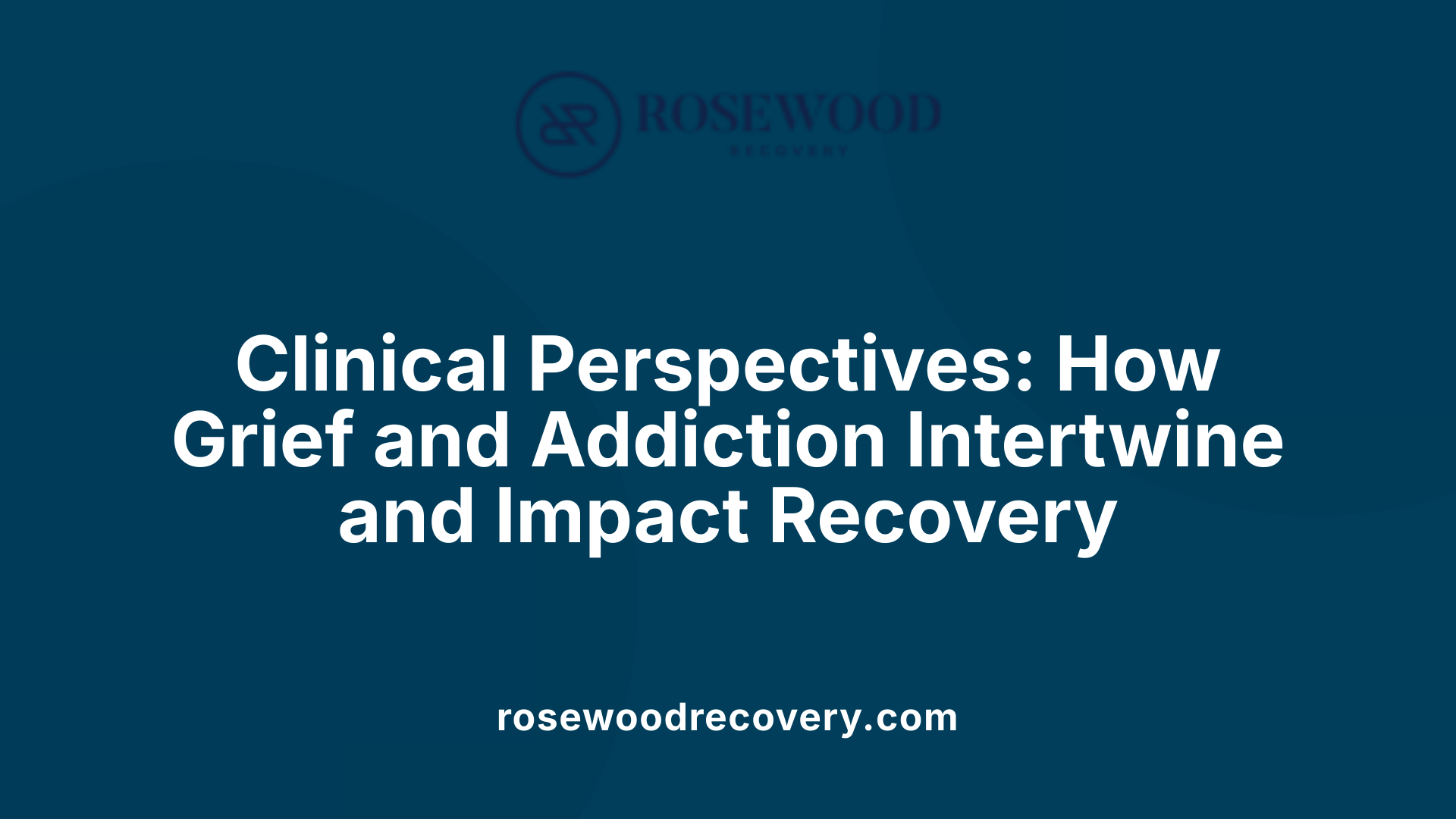
What are the clinical insights into the relationship between grief and substance use disorder?
Clinicians observe a profound link between prolonged grief and the development of substance use disorder (SUD). When individuals experience intense or unresolved grief—often characterized by chronic sadness, emotional numbness, and social withdrawal—they are more vulnerable to turning to alcohol or drugs as coping mechanisms. These maladaptive strategies temporarily mute emotional pain but can set a pattern for developing addiction.
Research highlights that certain coping styles, such as emotional expression, social withdrawal, wishful thinking, and self-criticism, are associated with higher levels of complicated grief (CG). Such strategies can hinder emotional processing and ongoing recovery. Individuals with SUD are especially prone to complicated grief because their substance use often masks deeper mourning issues, delaying emotional healing and aggravating mental health problems.
Importantly, neurobiological research shows that grief activates areas in the brain associated with reward and craving, notably the nucleus accumbens. Activation of this region during CG suggests that memories linked to loved ones or substances can trigger addictive behaviors. These neural pathways reinforce cravings for drugs or alcohol, compounding the difficulty of overcoming both grief and addiction.
Furthermore, social stigmatization and isolation, which frequently follow substance-related tragedies or loss, hinder help-seeking. The compounded effects make clinical management complex but not insurmountable. Effective treatment programs take a dual approach, combining grief counseling, behavioral therapies, and medication management tailored to address both emotional trauma and substance dependence.
Support structures like group therapy and family interventions are integral, providing social networks crucial for emotional recovery and relapse prevention. Overall, these insights emphasize the importance of a nuanced, empathetic approach that recognizes how grief and addiction fuel each other, striving to interrupt this cycle through targeted therapeutic strategies.
Neurobiological factors involved
Neurobiological research supports the clinical observations by outlining how grief influences brain function related to addiction. During episodes of complicated grief, imaging studies reveal heightened activity in the nucleus accumbens, a core component of the brain's reward system. This area is heavily involved in processing pleasure, motivation, and craving.
In individuals experiencing persistent grief, the activation of neural circuits associated with longing, desire, and reward suggests that emotional pain is intertwined with brain mechanisms also engaged when craving substances. This overlap indicates that grief can directly stimulate pathways involved in addiction, making affected individuals more susceptible to substance misuse.
Additionally, the medial prefrontal cortex, which regulates decision-making and emotional control, shows altered activity during CG. Dysregulation in this area may impair a person's ability to employ adaptive coping strategies, leading to increased reliance on substances for emotional regulation.
Hormonal responses also play a role. Elevated cortisol levels, the body's primary stress hormone, can sensitize the reward system and increase vulnerability to addiction. Oxytocin, a hormone associated with social bonding, may be involved in grief responses, with its levels fluctuating during mourning and potentially influencing attachment to substances as substitutes for lost bonds.
Understanding these neurobiological factors underscores why grief can act as a catalyst for addiction. It provides a biological foundation for why some individuals struggle more intensely with both grief and substance dependence, and it guides clinical efforts toward interventions targeting these neural pathways.
Key Risk Factors and Emotional Processes in Grief and Addiction
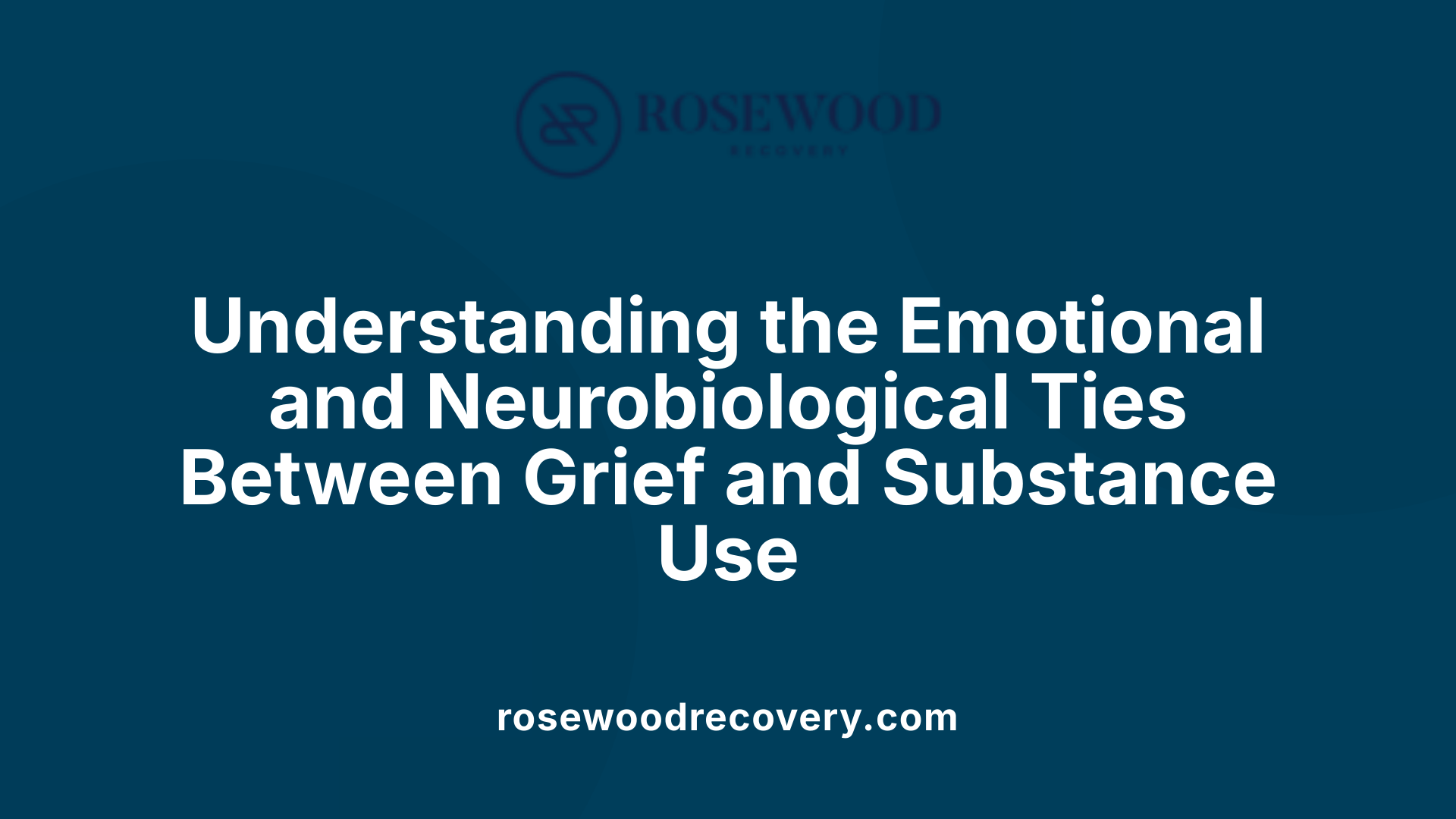
What risk factors and emotional processes contribute to the link between grief and substance use?
The connection between grief and substance use is complex and influenced by several risk factors and emotional behaviors. One significant factor is unresolved or complicated grief, which describes a prolonged, intense emotional response to loss that does not resolve naturally over time. This type of grief often leads to feelings of persistent sadness, anger, and emotional numbness, pushing some individuals to seek temporary relief through alcohol, drugs, or other substances.
Traumatic or sudden losses, such as the death of a loved one due to violence, accidents, or overdose, can intensify grief reactions. These abrupt and often unexpected events make it harder for individuals to process their emotions healthily, increasing the risk of turning to substances as a coping mechanism.
Lack of social support further compounds this vulnerability. Individuals isolated from family, friends, or community resources are more likely to struggle with their grief alone. Without meaningful support, they may resort to maladaptive strategies such as emotional suppression or avoidance, which can hinder healthy emotional processing.
Pre-existing mental health issues, especially depression and anxiety, also play a significant role. Research shows that both major depressive disorder and complicated grief are linked with higher rates of alcohol dependence and other substance misuse. These mental health conditions can make emotional regulation difficult, leading sufferers to use substances as a form of self-medication.
Neurobiological studies provide insight into these behaviors. When experiencing complicated grief, the brain’s reward center—particularly the nucleus accumbens—is activated. This area is also involved in addiction, suggesting that intense grief can stimulate compulsive need for substances, as they temporarily trigger feelings of pleasure or numbness.
Additionally, maladaptive coping mechanisms, such as emotional suppression, social withdrawal, and wishful thinking, often worsen grief outcomes. These strategies impede emotional expression and acceptance, further prolonging distress and increasing reliance on addictive substances.
Importantly, the relationship between grief and substance misuse is bidirectional. People with substance use disorders are more vulnerable to experiencing complicated grief because substance abuse often leads to personal losses—such as relationship breakdowns or health problems—that interfere with their ability to process grief effectively. This cyclical pattern complicates recovery and mental health, making it crucial for interventions to address both issues simultaneously.
In summary, unresolved or complicated grief, traumatic losses, social isolation, pre-existing mental health conditions, and neurobiological changes all contribute to the intertwined nature of grief and substance use. Understanding these factors helps in developing targeted treatment strategies to support individuals through their healing journey.
Treatment Paradigms: Tackling Both Grief and Substance Use
What treatment strategies address both grief and substance use?
Addressing both grief and substance use requires comprehensive, integrated approaches that target emotional healing and addiction recovery simultaneously. These treatment strategies recognize the complex relationship between experiencing loss and turning to substances as a coping mechanism.
One of the most effective methods involves combining various therapeutic modalities. Individual therapy, such as grief counseling and trauma-focused interventions, allows individuals to process complicated grief, understand their emotional responses, and develop healthier coping skills. Group therapy offers a supportive environment where individuals can share experiences, normalize their feelings, and learn from others facing similar challenges.
Complementary practices play a significant role in bolstering recovery. Mindfulness meditation, for example, helps regulate emotions and reduce stress, decreasing the urge to use substances. Creative therapies like art and music therapy provide outlets for emotional expression, facilitating healing without reliance on drugs or alcohol. Physical activities such as yoga or exercise not only improve physical well-being but also promote emotional resilience.
Support groups and community-based programs serve as ongoing sources of peer support, which can combat social withdrawal, a common feature of both grief and addiction. Groups like grief counseling groups or substance use recovery meetings facilitate social connection, foster a sense of belonging, and help prevent relapse.
Family involvement is also crucial, as it can help repair strained relationships and provide additional emotional support. Furthermore, relapse prevention strategies—such as recognizing triggers linked to grief episodes or emotional distress—are incorporated into treatment plans to sustain recovery.
By addressing the intertwined nature of grief and substance dependence through a holistic and layered approach, individuals are better equipped to navigate their emotional journeys and sustain long-term healing.
The Impact of Unresolved Grief on Dependency and Relapse
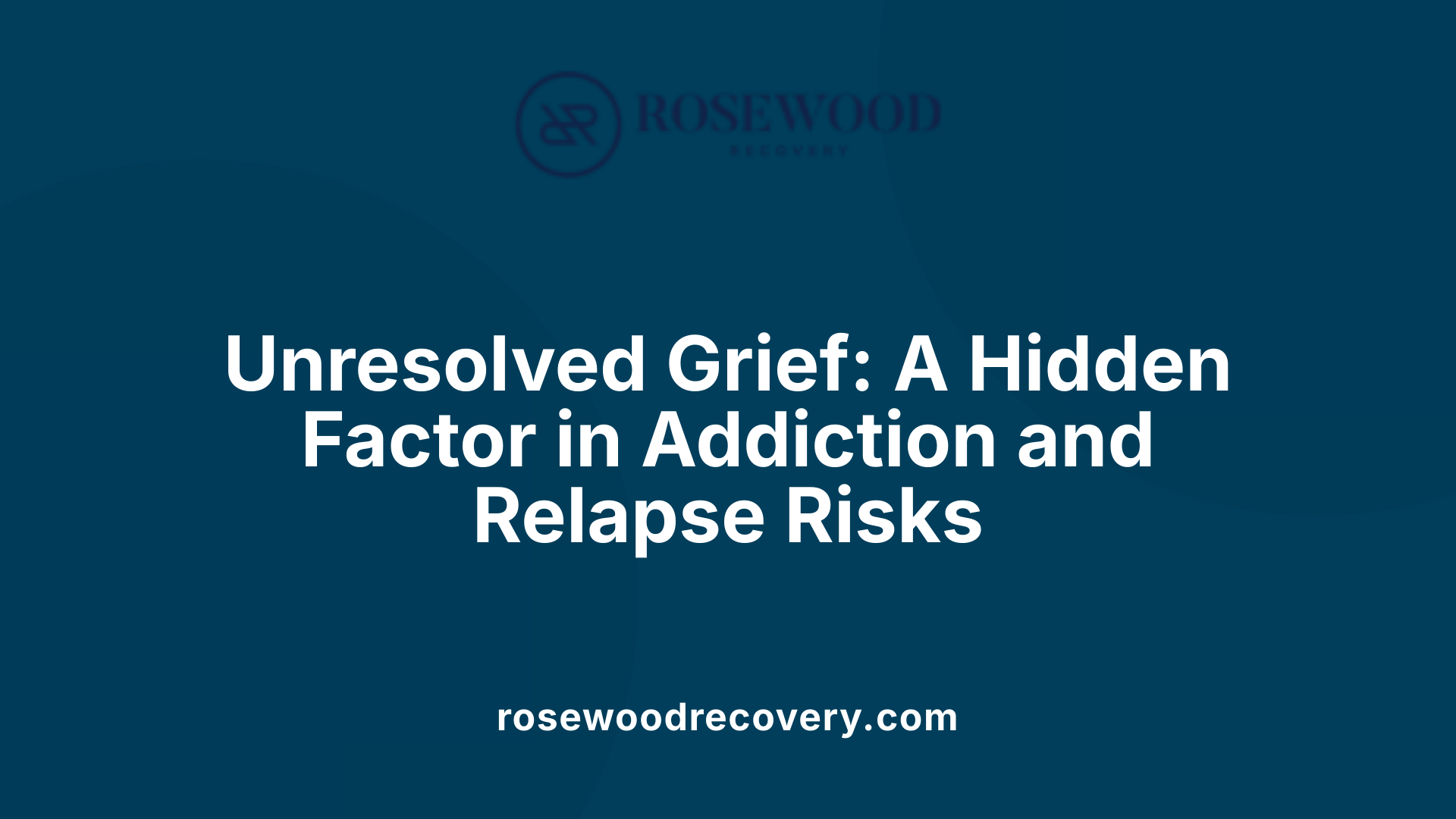
How does unresolved grief influence substance dependency?
Unresolved grief has a profound impact on the cycle of dependency, often acting as a catalyst for relapse among individuals in recovery. When grief remains unaddressed, it fuels ongoing emotional turmoil characterized by feelings of guilt, sadness, anger, and sometimes despair. These intense emotions can be overwhelming, leading individuals to seek comfort through substance use.
People coping with unresolved grief may turn to alcohol, drugs, or prescription medications as a way to numb their emotional pain temporarily. While this provides short-term relief, it hampers emotional healing and often deepens the reliance on substances, creating a vicious cycle. Over time, this dependency can morph into addiction, complicate recovery efforts, and increase the risk of relapse.
Research indicates that grief can activate neural pathways associated with reward and craving, reinforcing substance-seeking behaviors as a form of self-medication. The inability to process grief properly may also lead to prolonged or complicated grief disorder, which further elevates the likelihood of substance misuse.
Addressing unresolved grief in addiction treatment is crucial. Integrative approaches such as dual-diagnosis therapy focus on simultaneously managing grief-related issues and substance dependency. These therapies foster healthier coping skills, facilitate emotional expression, and help restructure thought patterns to reduce relapse risk.
Cycle of dependency
Unresolved grief initiates a cycle where emotional pain prompts substance use, which temporarily masks the feelings but ultimately exacerbates emotional distress. This cycle can be depicted as follows:
| Stage | Description | Consequence |
|---|---|---|
| Emotional distress | Loss triggers intense feelings | Drives craving for relief |
| Substance use | Use of alcohol or drugs to numb pain | Short-term escape, long-term dependency |
| Temporary relief | Feelings of numbness or calm | Reinforces substance reliance |
| Emotional suppression | Avoidance of grief | Prevents healing, deepens dependency |
| Repeat | Cycle continues | Heightened risk of relapse and complications |
Emotional numbing and dependency
Numbing emotional pain is a common response to unresolved grief. Substances like alcohol and sedatives are often used to dull feelings of sadness, anger, or guilt, providing immediate relief. However, this approach delays processing emotions and impairs long-term emotional regulation.
Over time, reliance on substances for emotional numbing entrenches dependency, making it harder for individuals to confront their loss healthily. The brain's reward systems become conditioned to associate substance use with emotional relief, increasing cravings and risk of addiction.
Treatment considerations for unresolved grief
Treating unresolved grief alongside substance dependency requires tailored interventions. Effective strategies include:
- Grief counseling: Helps individuals process their loss, express emotions, and develop acceptance.
- Dual-diagnosis therapy: Addresses both grief and addiction concurrently, preventing reliance on substances.
- Group therapy: Provides social support, normalizes emotional reactions, and encourages healthy sharing.
- Mindfulness and relaxation techniques: Aid in emotional regulation and stress management.
- Holistic approaches: Incorporate physical activity, nutrition, and spiritual practices to foster healing.
Recognizing and treating unresolved grief is vital to breaking the cycle of dependency and reducing relapse risk. By integrating grief processing into addiction treatment, individuals can rebuild resilience, establish adaptive coping mechanisms, and move toward emotional recovery.
Consequences of Grief on Mental and Physical Health in Addiction Recovery
What effects does grief have on mental health and recovery from substance use?
Grief plays a profound role in shaping an individual's mental health, especially during addiction recovery. When a person experiences the loss of a loved one, they often face intense emotions such as sadness, anger, guilt, and confusion. These feelings can lead to social withdrawal and emotional dysregulation, which complicate recovery efforts.
Unresolved or prolonged grief, known as complicated grief, is particularly concerning because it heightens the risk of developing mental health conditions like major depression and complicated grief disorder. These conditions often coexist with substance dependence, creating a cycle difficult to break.
Many individuals cope with grief by turning to substances such as alcohol, cocaine, or stimulants to temporarily numb their emotional pain or escape their distress. While this may offer immediate relief, it generally hampers long-term emotional healing and worsens mental health outcomes.
Maladaptive coping strategies are common among grieving individuals struggling with addiction. These include social withdrawal, wishful thinking, self-criticism, and avoidance behaviors. Such approaches may provide short-term solace but ultimately prevent healthy processing of grief and recovery.
Research indicates that effective integration of grief counseling and mental health support into addiction treatment can significantly improve outcomes. Approaches like group processing, cognitive-behavioral therapy, and trauma-focused interventions help address unmet emotional needs, reduce cravings, and lower the likelihood of relapse.
How does grief influence physical health risks in individuals recovering from addiction?
Beyond psychological impacts, grief can manifest physically, exacerbating health problems and increasing risks during recovery. Elevated stress levels during grief trigger hormonal responses such as increased cortisol, which can impair immune function, elevate blood pressure, and contribute to cardiovascular issues.
Physical symptoms like fatigue, sleep disturbances, appetite changes, and physical aches are common in grieving individuals. When combined with the physiological toll of substance dependence, these symptoms can compromise overall health.
Chronic grief can also contribute to behaviors that jeopardize physical well-being, such as poor nutrition, substance misuse, and neglecting medical needs. For example, high alcohol consumption and drug abuse can lead to liver disease, heart problems, and neurological impairments.
Furthermore, studies have shown that grief-related activation of the brain’s reward centers, like the nucleus accumbens, and neural pathways linked with addictive behaviors worsen health risks. This neural overlap makes it particularly challenging for individuals to break free from both grief and substance dependence.
What barriers does grief create in the recovery process?
Grief poses significant barriers to successful recovery by complicating emotional regulation and decision-making. The emotional burden can diminish motivation to adhere to treatment plans, attend support groups, or engage in therapy.
Many individuals find that their capacity for self-care diminishes when overwhelmed by grief. Feelings of hopelessness and social withdrawal may lead to missed appointments, neglected medication routines, or relapse into substance use.
Stigma and social isolation, often associated with both grief and substance use disorder, further impede recovery efforts. Bereavement, especially in cases involving stigmatized deaths like overdose or suicide, can lead to disenfranchised grief, where individuals feel invalidated or misunderstood—hampering their healing process.
Additionally, the presence of unresolved grief can entrap individuals in negative emotional cycles, preventing acceptance and closure, which are crucial steps in overcoming addiction.
To overcome these barriers, comprehensive treatment programs that incorporate grief counseling, mental health therapy, and peer support are essential. Such integrative approaches help individuals process their loss, develop adaptive coping mechanisms, and build resilience against relapse.
| Aspect | Impact | Additional Notes |
|---|---|---|
| Mental health effects | Increased depression, anxiety, and risk of complicated grief | These conditions often lead to worsening substance dependence outcomes |
| Physical health risks | Cardiovascular issues, weakened immune system, sleep disorders | Physical symptoms can persist or worsen with ongoing grief and substance use |
| Recovery barriers | Reduced motivation, social isolation, treatment non-compliance | Addressing grief is vital to breaking this cycle and supporting recovery |
Understanding the intertwined effects of grief on mental and physical health emphasizes the importance of integrated care. Addressing emotional loss with appropriate support enhances the chances of sustainable recovery and overall well-being.
The Role of Cultural and Social Factors in Grief and Addiction
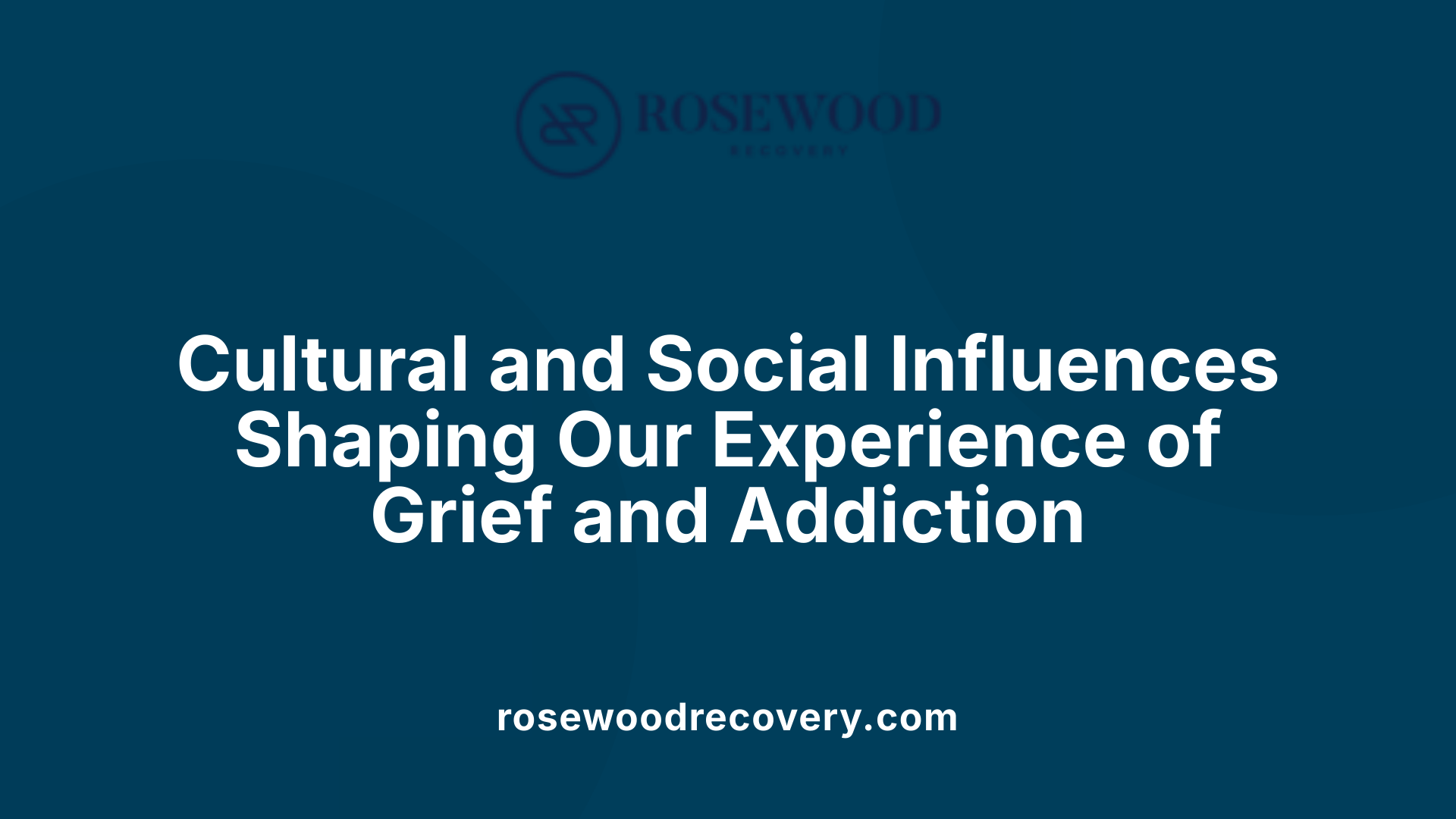
How does stigmatization and social perception influence grief and addiction?
Stigmatization plays a significant role in shaping how individuals experience and cope with grief and substance use. Societies often attach negative labels to addiction and mental health struggles, leading to feelings of shame, guilt, and isolation among those affected. For example, bereaved individuals dealing with loss related to substance-related deaths or suicide frequently encounter social stigma, which can hinder their willingness to seek support and openly mourn.
This social perception can exacerbate the emotional burden of grief, especially when the loss is stigmatized or misunderstood. Family members of individuals with substance use disorder (SUD) may also experience stigmatization, affecting their social interactions and emotional wellbeing. Moreover, societal messages that equate addiction with moral failure discourage compassion and understanding, making recovery and emotional processing more difficult.
The stigma surrounding mental health and addiction not only delays help-seeking behavior but can also reinforce feelings of shame, which are linked to prolonged and complicated grief. Addressing stigmatization requires culturally sensitive education and awareness programs aimed at reducing negative perceptions and promoting compassionate support.
What support systems and community resources exist for those coping with grief and addiction?
Support structures are essential in managing grief and addressing addiction. Community resources such as grief counseling, support groups, and mental health services provide vital outlets for individuals to express their emotions and share experiences. Programs like Al-Anon, bereavement groups for substance-related losses, and peer-led support initiatives help create safe environments for healing.
Family therapy, individual counseling, and holistic approaches like mindfulness and stress reduction techniques are also effective. Moreover, integrated treatment programs that combine substance use therapy with grief counseling, a form of dual diagnosis treatment, have shown promising results in reducing symptoms of both grief and addiction.
Offering accessible services that are culturally appropriate and community-based encourages participation and helps combat social isolation. Community centers, religious organizations, and non-profit agencies often work collaboratively to provide these supportive services, emphasizing the importance of local engagement.
How does societal messaging impact grief and substance use behaviors?
Societal messages and media portrayals significantly influence perceptions of grief and addiction. Messages that sensationalize or stigmatize substance-related deaths can deepen feelings of shame and guilt among the bereaved. Conversely, positive and compassionate messaging that emphasizes understanding and recovery encourages healthier grieving processes and reduces shame.
Cultural narratives around grief, such as expectations to 'move on' quickly or suppress emotions, can lead to unhelpful coping strategies, including substance use. For example, in some cultures, expressing grief openly may be taboo, resulting in internalized pain that increases the risk of prolonged grief disorder and substance misuse.
Educational campaigns that promote mental health awareness and destigmatize addiction can transform societal attitudes. By fostering an environment of empathy and openness, communities can support healthier grieving processes and reduce the reliance on substances as a means of coping.
Table summarizing how cultural and social factors impact grief and addiction
| Aspect | Influence | Outcomes | Strategies for Improvement |
|---|---|---|---|
| Stigmatization | Reinforces shame and secrecy | Delayed help-seeking, prolonged grief, increased substance use | Public education, anti-stigma campaigns |
| Support systems | Provide emotional outlets and professional help | Facilitates recovery, reduces isolation | Expand community-based programs, culturally tailored services |
| Societal messages | Shape norms about expressing grief and seeking help | Unhealthy coping, avoidance of support | Promote positive narratives, mental health awareness campaigns |
| Cultural perceptions | Influence grief rituals and attitudes towards addiction | Variability in coping, recovery success | Culturally sensitive support, inclusive policies |
Understanding the intersection of culture and social influences on grief and addiction underscores the need for holistic, empathetic approaches. Policies and community initiatives should aim to dismantle stigma, enhance support resources, and promote positive societal messages—factors that collectively foster resilience and aid in healthier grieving and recovery processes.
Developing Resilience and Healthy Coping Strategies
How does the expression of emotions aid in resilience after loss?
Expressing emotions is vital in navigating grief effectively. When individuals openly share their feelings—whether through talking, writing, or creative outlets—they allow themselves to process pain rather than suppress it. Suppressed emotions, on the other hand, can lead to unhealthy coping mechanisms such as substance use, which may escalate into addiction. Encouraging emotional expression helps reduce feelings of anger, sadness, and guilt that often accompany grief.
Why is seeking professional support important in dealing with grief and addiction?
Professional support plays a crucial role in managing complicated grief and substance use. Therapists trained in grief counseling and addiction treatment can provide tailored approaches like Cognitive Behavioral Therapy (CBT) or Complicated Grief Therapy (CGT) that target specific emotional challenges. These interventions can decrease depressive symptoms, reduce cravings, and help individuals develop healthier coping mechanisms. Moreover, medication management might be necessary for co-occurring disorders such as depression or anxiety.
How can building social connections promote resilience?
Strong social ties act as a buffer against the negative effects of grief and substance misuse. Connecting with empathetic friends, family, or support groups offers emotional validation and reduces feelings of isolation. Support groups like Al-Anon or bereavement groups related to substance-related deaths provide safe spaces for sharing experiences, gaining insights, and fostering a sense of community. Social engagement encourages adaptive coping, diminishes withdrawal tendencies, and reinforces the journey toward acceptance.
What is the role of acceptance and moving forward?
Acceptance is the final step in the grieving process, allowing individuals to integrate their loss into their lives healthily. It does not mean forgetting or diminishing the significance of the loved one but involves understanding and coming to terms with reality. Moving forward includes setting new goals, establishing routines, and finding purpose beyond the loss. Practicing mindfulness, maintaining a focus on self-care, and celebrating milestones contribute to emotional resilience. This process often requires time, patience, and sometimes professional guidance, especially for those with complicated grief or addictive behaviors.
| Aspect | Approach | Tool/Method |
|---|---|---|
| Emotional expression | Sharing feelings, creative outlets, journaling | Art therapy, support groups |
| Professional support | Therapy, medication, structured counseling | CBT, CGT, medication management |
| Social connections | Building relationships, joining support groups | Group therapy, family therapy |
| Acceptance and moving forward | Embracing reality, setting new goals, mindfulness practices | Mindfulness meditation, therapy |
Resilience building involves a combination of emotional openness, seeking professional help, fostering supportive relationships, and working towards acceptance. Each step reinforces the other, creating a robust foundation to weather the storm of grief and avoid slipping into substance misuse. Developing these skills is an ongoing process, often requiring dedication and the willingness to confront painful emotions, ultimately leading to healthier recovery paths.
Holistic Approaches to Managing Grief and Substance Use
Addressing the intertwined issues of grief and substance use requires a comprehensive, holistic approach that combines clinical, emotional, and social strategies. Recognizing the neurobiological, psychological, and societal factors involved is essential for effective intervention. Early and integrated treatment, support systems, and resilient coping mechanisms can improve mental health outcomes, reduce relapse rates, and foster emotional healing. Ultimately, understanding and compassion are key to guiding individuals through their grief and towards sustained recovery.
References
- A Report on Grief and Addiction | Research Update
- Grief & Addiction: The Connection & Finding Treatment Near Me
- Coping Strategies and Complicated Grief in a Substance Use ...
- Grief and Substance Abuse - The Recovery Village
- The Link Between Complicated Grief and Substance Use Disorder
- The relationship between substance misuse and complicated grief
- The Role of Grief in Addiction | Psychology Today
- 4 Ways Grief Can Lead To Addiction
- The Role of Grief and Loss in Addiction Recovery - Oxbow Academy
- How Unresolved Grief Can Impact Addiction - Pyramid Healthcare




